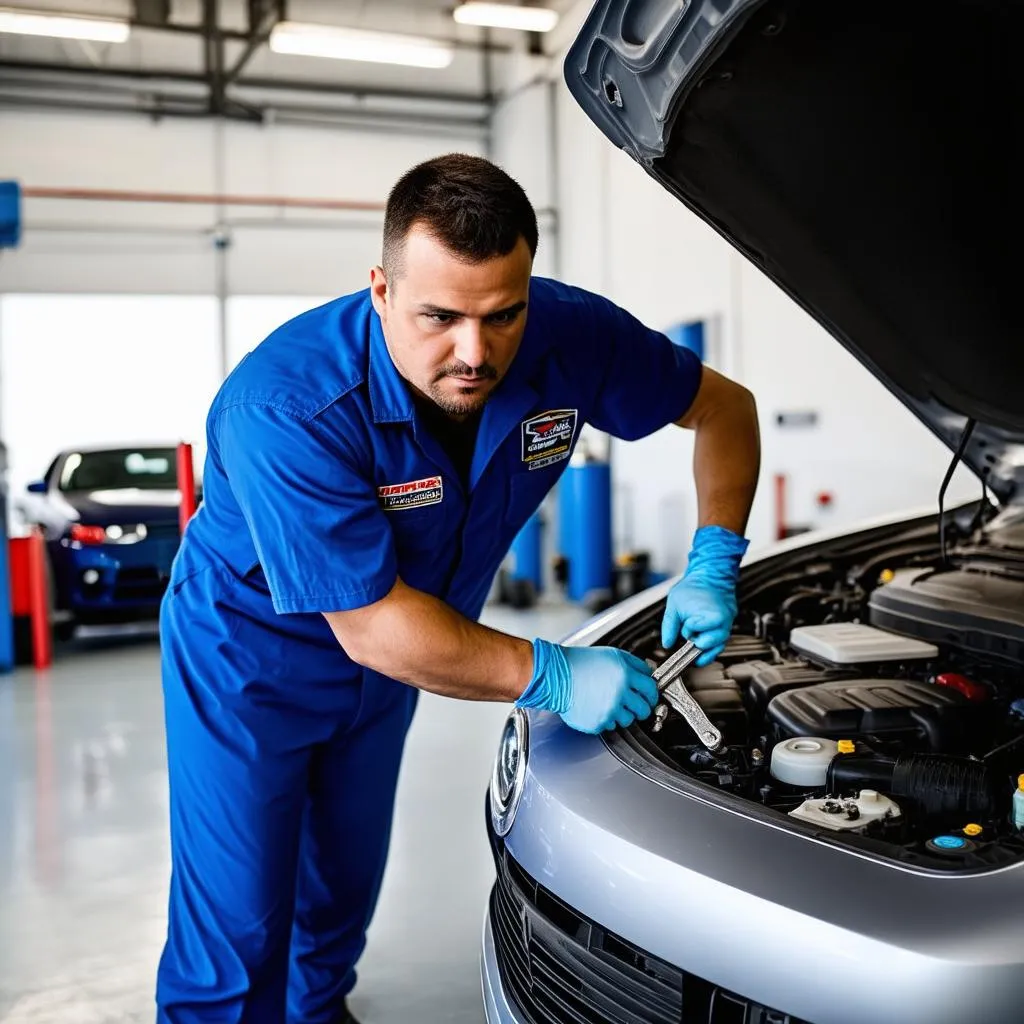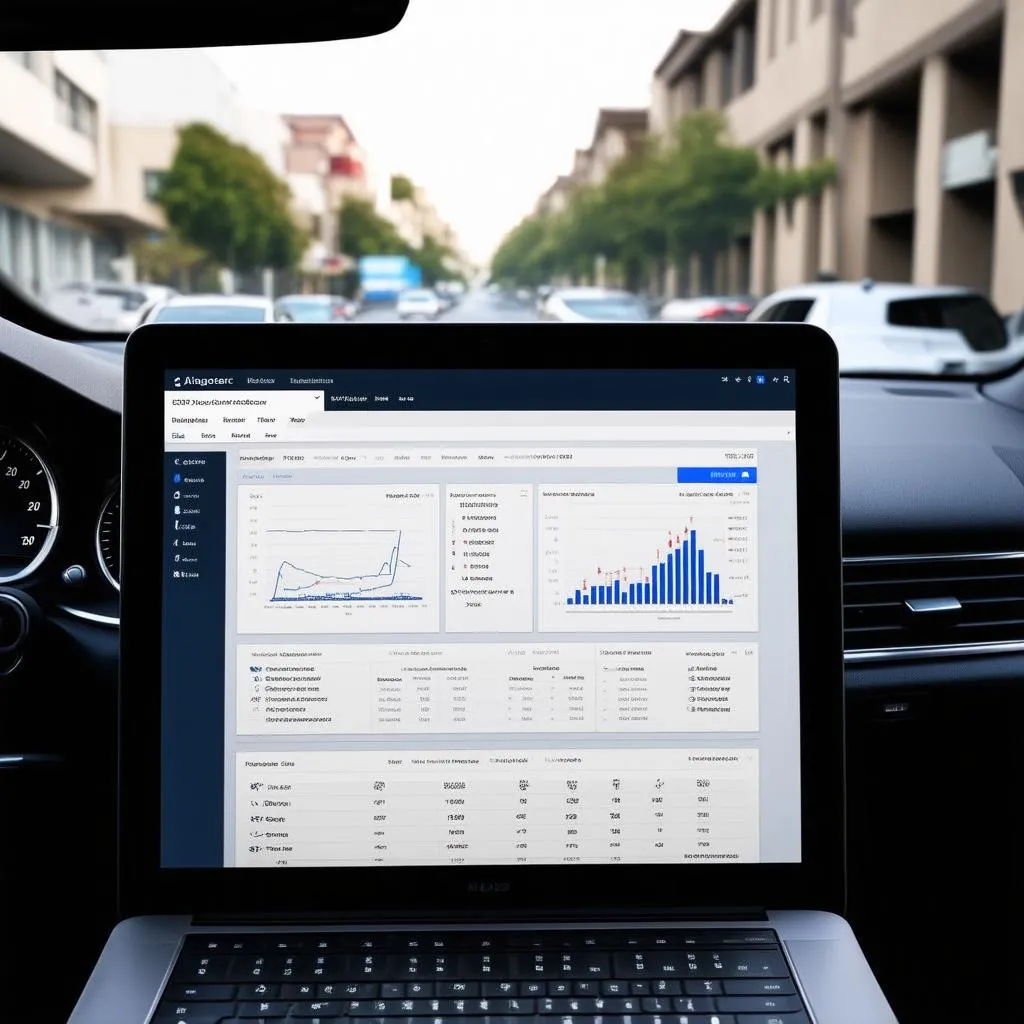Imagine this: Your trusty 2018 Audi A4, usually a smooth operator, starts acting up. The “check engine” light throws a yellow glare across your dashboard. You whip out your trusty OBD scanner, the one specifically designed for European cars, hoping for a quick diagnosis. But then, silence. The scanner throws back an unhelpful “El Obd No Detecta Falla”— “no fault detected.” Frustrating, right?
Don’t panic. You’re not alone. This scenario is surprisingly common for car owners, especially those who like to tinker with their vehicles. Let’s break down why your OBD scanner might be playing coy and, more importantly, what you can do about it.
What Does “El OBD No Detecta Falla” Really Mean?
This phrase, common in Spanish-speaking regions, basically translates to “the OBD doesn’t detect a fault.” It means your OBD-II scanner, the digital mechanic in your glove box, isn’t picking up any trouble codes from your car’s computer.
From a mechanic’s perspective, this can be a head-scratcher. It’s like going to the doctor when you feel sick, only to be told all your vitals are perfect.
From a technical standpoint, it suggests there’s a disconnect somewhere in the system. The problem might not be serious enough to trigger a code, or there might be a communication error between the car and the scanner.
Economically speaking, this “no fault” message can be a double-edged sword. On the one hand, no news is good news, right? Maybe you dodged a costly repair. On the other hand, you’re left with a lingering issue and the uncertainty of not knowing what’s truly wrong.
Why Your OBD Scanner is Saying “No” When Your Car is Saying “Yes”
Several factors can lead to a “no fault detected” message, even when you know something’s amiss:
- Minor Glitches: Just like our smartphones occasionally freeze, cars experience minor electronic hiccups. These might trigger a warning light momentarily but not be significant enough to log a code.
- Loose Connections: A loose gas cap, a corroded battery terminal, or a slightly unplugged sensor can disrupt communication between the car’s computer and the OBD-II port.
- Faulty OBD-II Port or Scanner: Sometimes the problem lies with the diagnostic tools themselves. A damaged port or a malfunctioning scanner won’t be able to retrieve any information.
- Specific Vehicle Issues: Certain vehicle systems, particularly those not directly related to emissions (like the radio or power windows), might not always trigger OBD codes even if there’s a fault.
Take, for example, John from Miami. He brought his VW Golf to a repair shop after getting the “no fault” message, even though his engine was clearly misfiring. Turns out, a rodent had chewed through a wire harness near the ECU (Engine Control Unit), causing intermittent communication issues that the scanner couldn’t pinpoint.
So, Your Scanner Drew a Blank. What Now?
Don’t despair! Here’s a game plan:
- Check the Basics: Ensure your gas cap is securely fastened, your battery terminals are clean and tight, and there are no visibly loose wires under the hood.
- Try a Different Scanner: Borrow a friend’s scanner or visit an auto parts store that offers free code reading. A different scanner might pick up what yours missed.
- Consult a Professional: If the problem persists, it’s time to call in the experts. A qualified mechanic can utilize advanced diagnostic tools, like dealer-level scanners, to delve deeper into your car’s systems.
As Sarah, a seasoned mechanic from Chicago, often says: “OBD scanners are great tools, but they’re not foolproof. Sometimes you need a trained eye and a bit of intuition to get to the bottom of things.”
 Mechanic checking car engine
Mechanic checking car engine
FAQs: When “El OBD No Detecta Falla” Has You Stumped
Q: My check engine light is on, but the scanner says no codes. Should I still be worried?
A: It’s always best to err on the side of caution. While it could be a minor glitch, a persistent warning light warrants further investigation.
Q: Can I drive my car if the OBD scanner doesn’t detect any faults?
A: If your car is running smoothly and showing no other warning signs, you can likely drive it cautiously. However, if you experience unusual noises, vibrations, or performance issues, it’s best to pull over and seek assistance.
Q: Is it worth investing in an expensive, dealer-level scanner?
A: For the average car owner, a basic OBD-II scanner is sufficient. However, professional mechanics or serious DIY enthusiasts might find value in the advanced features and comprehensive code libraries offered by dealer-level scanners.
Keep Calm and Diagnose On!
Dealing with car troubles can be stressful, especially when your diagnostic tools don’t provide clear answers. Remember, “el obd no detecta falla” doesn’t always mean your car is in the clear. A little investigation and expert help can go a long way in ensuring your vehicle stays healthy and on the road.
Looking for more information on car diagnostics or need help choosing the right scanner for your needs? Check out these related articles:
- OBD-II Scanners: The Ultimate Guide
- Understanding Common Check Engine Light Codes
- DIY Car Repair: Essential Tools and Tips
Need personalized assistance with your car’s diagnostics or software installation? Contact our team of automotive experts via Whatsapp at +84767531508. We’re here to help 24/7.
 Car diagnostic software on laptop
Car diagnostic software on laptop
Remember, a well-informed car owner is a confident car owner. Keep learning, keep asking questions, and never hesitate to seek professional help when needed. Safe driving!
